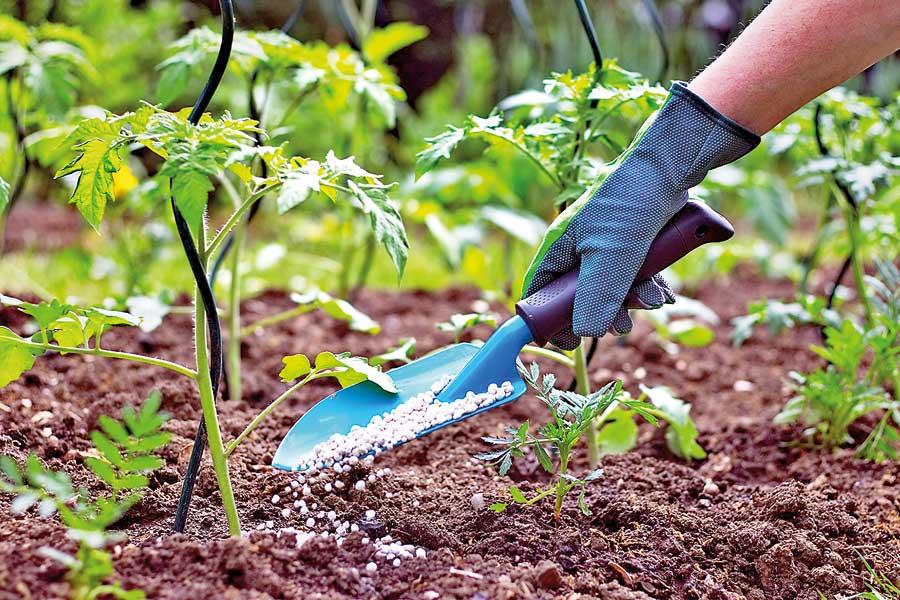Reply To:
Name - Reply Comment

Experts affirm that plant pathogens and invasive species in the imported organic fertiliser may contain deadly human and animal pathogens
- In soil organisms Bacillus anthracis is deadly. It causes anthrax and that can cause sudden death in humans and animals
- Bacillus Anthrasis is known to survive in soil or compost for at least 50 years
- The presence of Bacillus bacteria in a shipment heading to Sri Lanka must be viewed with extreme caution
In an interview on a television channel the Director of Agriculture said that the authorities would not go back on the decision of not importing inorganic fertilizer.
decision of not importing inorganic fertilizer.
For years the Department of Agriculture had in its research programmes was advocating inorganic fertilizer and had submitted material which was rusting in the cupboards of the Department. If this largest state department had acted ten years ago then the decision by the government go organic could have been implemented at least to a point
In the meantime the dons, especially from the University of Peradeniya, like Dr.Rasika Jinadasa, of the department of Microbiology at the Faculty of Veterinary Medicine of the Univesity of Peradeniya, says that the causative agent/s for KDU in Sri Lanka is yet unknown. All developed nations have achieved food security and the capacity to export substantial excess of produce.
Dr.Jinadasa is not only a Graduate from the University of Peradeniya, but possesses a Master’s from Nebraska and a Ph.D from Cornell Universtiy. He says that highly distinguished and trained professionals have already highlighted the negative effects the sudden decision taken to ban chemical fertilzer could have on food security, the livelihood of the farmers and the economy of the country. This decision has attracted much criticism from stakeholders in the Agriculture, Industry and Commerce.
Dr. Jinadasa said that the popular slogans to justify the ban were ‘harmful chemicals/toxins’ in chemical fertilizer and ‘to create a green agriculture’, which was in fact floated without any solid facts.
To substantiate his clame Dr.Jinadsa adds that all developed nations in the world have achieved food security and the capacity to export substantial excess of produce only with the appropriate use of chemical fertilizer. Used within the prescribed guidelines, modern good quality chemical fertilizers are generally safe commodities. It is proven beyond reasonable doubt that the world cannot meet the growing demand for food without prudent use of chemical fertilizer.
The potential double blow to food security and environmental safety comes from the equally sudden attempt to import organic fertilizer; apparently from China at least initially. The importation of organic fertilizer, or any organic matter or even anything that contains soil for that matter is banned by many developed nations; particularly by countries with well-developed agriculture sectors. The regulations are usually stricter in island nations such as New Zealand and Australia. Currently, it is banned in Sri Lanka as well.
The governments ‘sudden’ decision to ban chemical fertilizer has received much criticism from all stakeholders in the Agriculture, Industry and Commerce sectors.
"All developed nations in the world have achieved food security and the capacity to export substantial excess of produce only with the appropriate use of chemical fertilizer - Dr. Rasika Jinadasa"
The potential blow to food security and enviromental safety comes from the equally sudden attemtpt to improt Organic fertilizer, appraently from China at least intially. The regulations are usually stricter in island nations such as New Zeand and Australia, says Dr.Jinadasa. Currently, it is banned in Sri Lanka as well.
Dr.Jinadasa says that organic fertilizer should be prevented from being imported to stop plant pathogens and invasive species from entering a country; which could devastate the entire agriculture sector of a coutry literally overnight.
In addition Dr. Jinadasa said that plant pathogens and invasive species in the imported organic fertilizer may contain deadly human and animal pathogens that may be detrimental to humans and animal health. Introducing animal pathogens alone could have devasting effects on the ecology of a developing country such as Sri Lanka, Dr.Jinadasa said.
Sounding a warning Dr.Jinadasa said that the extreme danger posed by Erwinia to the vegetable crops has been underscored by other experts. The presence of Bacillus bacteria in a shipment heading to Sri Lanka must be viewed with extreme caution. Most Bacillus bacteria in solid or animal manure are harmless organisms. But in soil organisms Bacillus anthracis is deadly. It causes anthrax and that can cause sudden death in humans and animals. The disease could spread by air and the baceria is categorised as a biological weapon. Some Bacillus bacteria, inclding the deatly Bacilus Anthracis, can survive the natural composting temperatures to 70 degrees Celcius and can remain alive in the soil or compost for an extended duration.Bacillus Anthrasis is known to survive in soil or compost for at least 50 years.
The last case of suspected anthrax was reported in Sri Lanka some 40 years ago and therefore we have yet to declare the anthrax-free status ( need to wait for 50 years hence after the last case the bacterial may still be surviving in the soil).
Dr. Jinadasa said that Anthrax is currently present in China. Therfore technically if the country decides to import soild or organic mater from China we are risking of introducing a deadly disease to the country and we also loose the chance or declaring an Anthrax-free status in the near future.
Being an island nation the easiest way to prevent the introduction of new diseases is to simply implement strict biosafety measures at our ports and airports; which will ensure that no new pathogens will enter the country.
Drawing a similarity on what’s said by other professionals Dr. Jinadasa pointed out that the country could have prevented or at least controlled or delayed the COVID-19 outbreak in Sri Lanka if timely measures were taken at the inception.
"Being an island nation the easiest way to prevent the introduction of new diseases is to simply implement strict biosafety measures at our ports and airports; which will ensure that no new pathogens will enter the country."
Dr. Jinadasa said that many island nations and other nations like Australia, Japan, the United Kingdom and New Zealand do not have rabies. They never had it or vaccinated and eradicated it and are maintaining very tight border controls to prevent the possible entry of it from other countries.
Sri Lanka, Dr.Jinadasa says, is a littel island and is still struggling to control rabies. The secod highes cost for a single drug for the Ministry of Health is the rabies vaccine.
Among the devastating viral diseases in cattle called Rinderpest was recently eradicated from the world, but in Sri Lnaka an ouybreak was once reported.
The last such outbreak in Sri Lanka was apparently linked to goats that came to Sri Lanka; with the Indian Peadce Keeping Force.
The ingredients used to make organic ferilizer is critical for its quality and safety. Many manures-particularly poultry manure- conatians large quantities of antibiotic residues and bacteria that are resistant to bacteria and may enter the food chain and eventually make human pathogens resistant to most common antibiotics. Hence the doctors will be without options when treating patients. Dr. Jinadasa said that China is a heavy antibiotic user in terms of livestock production.
He says that Cyanobacteria produce contains potent toxins and survive the noraml composting temperature and those toxins actually cause CKDU.